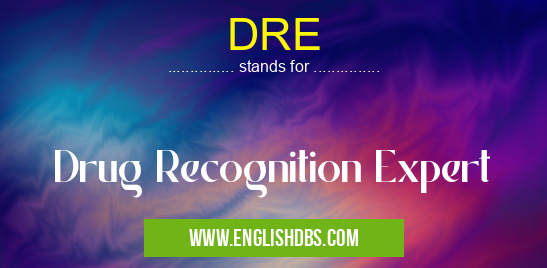What does DRE mean in LAW & LEGAL
In the realm of governmental law enforcement, the acronym DRE stands for Drug Recognition Expert. These highly trained professionals play a critical role in identifying individuals who are impaired by drugs, helping to keep our roads and communities safe.

DRE meaning in Law & Legal in Governmental
DRE mostly used in an acronym Law & Legal in Category Governmental that means Drug Recognition Expert
Shorthand: DRE,
Full Form: Drug Recognition Expert
For more information of "Drug Recognition Expert", see the section below.
DRE Meaning in Government
Drug Recognition Expert (DRE) is a law enforcement officer who has undergone specialized training to recognize and evaluate individuals suspected of being under the influence of drugs. DREs are experts in:
- Drug Recognition Techniques: DREs use a standardized series of physical, behavioral, and physiological tests to determine if an individual is under the influence of drugs.
- Drug Effects: DREs are knowledgeable about the effects of different types of drugs on the human body and behavior.
- Evidence Collection: DREs can collect evidence, such as drug paraphernalia, from suspected impaired drivers.
Importance of DREs
DREs play a vital role in:
- Enhancing Road Safety: DREs help to identify and remove impaired drivers from the roads, reducing the risk of accidents and fatalities.
- Improved Evidence Collection: DREs provide objective and scientific evidence of drug impairment, which can be used in court proceedings.
- Public Health: DREs contribute to the public health by identifying individuals who need substance abuse treatment and intervention.
Essential Questions and Answers on Drug Recognition Expert in "GOVERNMENTAL»LAW"
What is a Drug Recognition Expert (DRE)?
A Drug Recognition Expert (DRE) is a certified law enforcement officer with specialized training in the identification and evaluation of drivers under the influence of drugs. DREs undergo rigorous training to become certified and must maintain their certification through continuing education.
What does a DRE do?
DREs are responsible for conducting standardized field sobriety tests and evaluating suspects for drug impairment. They use a 12-step process that includes observations of the suspect's behavior, physical symptoms, and performance on standardized tests. DREs can also administer chemical tests, such as blood or urine tests, to confirm the presence of drugs in the suspect's system.
How do DREs get certified?
DREs must complete a comprehensive training program accredited by the International Association of Chiefs of Police (IACP). The training program includes classroom instruction, field training, and a written examination. To maintain certification, DREs must complete continuing education courses every two years.
Are DREs reliable?
Yes, DREs are considered to be highly reliable in the evaluation of drug impairment. Their standardized field sobriety tests and observations are based on scientific research and have been shown to be effective in identifying drivers under the influence of drugs.
What drugs can DREs detect?
DREs are trained to detect a wide range of drugs, including:
- Marijuana
- Cocaine
- Methamphetamine
- Heroin
- PCP
- Prescription drugs
- Over-the-counter medications
Final Words: Drug Recognition Experts (DREs) are highly skilled law enforcement professionals who play a crucial role in combating drug-impaired driving. Their expertise helps to ensure the safety of our communities, providing evidence for legal proceedings, and contributing to public health initiatives.
DRE also stands for: |
|
| All stands for DRE |
